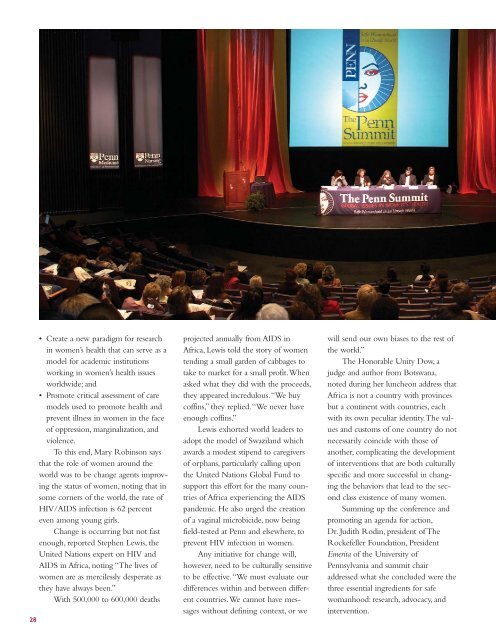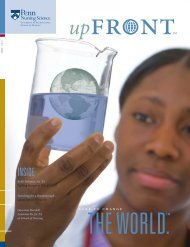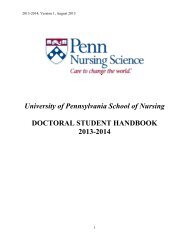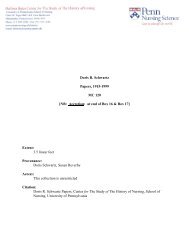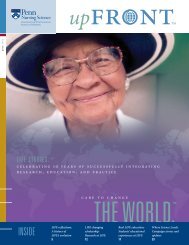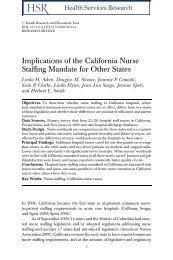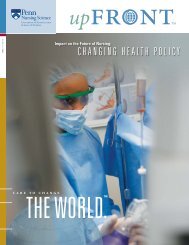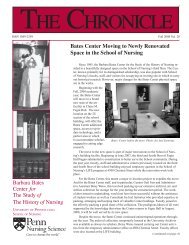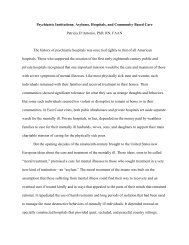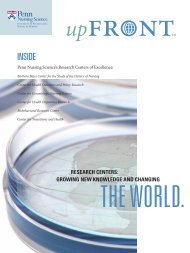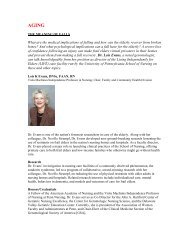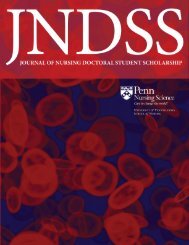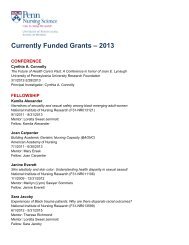Penn Nursing 090805_final_4c - University of Pennsylvania School ...
Penn Nursing 090805_final_4c - University of Pennsylvania School ...
Penn Nursing 090805_final_4c - University of Pennsylvania School ...
You also want an ePaper? Increase the reach of your titles
YUMPU automatically turns print PDFs into web optimized ePapers that Google loves.
28<br />
• Create a new paradigm for research<br />
in women’s health that can serve as a<br />
model for academic institutions<br />
working in women’s health issues<br />
worldwide; and<br />
• Promote critical assessment <strong>of</strong> care<br />
models used to promote health and<br />
prevent illness in women in the face<br />
<strong>of</strong> oppression, marginalization, and<br />
violence.<br />
To this end, Mary Robinson says<br />
that the role <strong>of</strong> women around the<br />
world was to be change agents improving<br />
the status <strong>of</strong> women, noting that in<br />
some corners <strong>of</strong> the world, the rate <strong>of</strong><br />
HIV/AIDS infection is 62 percent<br />
even among young girls.<br />
Change is occurring but not fast<br />
enough, reported Stephen Lewis, the<br />
United Nations expert on HIV and<br />
AIDS in Africa, noting “The lives <strong>of</strong><br />
women are as mercilessly desperate as<br />
they have always been.”<br />
With 500,000 to 600,000 deaths<br />
projected annually from AIDS in<br />
Africa, Lewis told the story <strong>of</strong> women<br />
tending a small garden <strong>of</strong> cabbages to<br />
take to market for a small pr<strong>of</strong>it.When<br />
asked what they did with the proceeds,<br />
they appeared incredulous.“We buy<br />
c<strong>of</strong>fins,” they replied.“We never have<br />
enough c<strong>of</strong>fins.”<br />
Lewis exhorted world leaders to<br />
adopt the model <strong>of</strong> Swaziland which<br />
awards a modest stipend to caregivers<br />
<strong>of</strong> orphans, particularly calling upon<br />
the United Nations Global Fund to<br />
support this effort for the many countries<br />
<strong>of</strong> Africa experiencing the AIDS<br />
pandemic. He also urged the creation<br />
<strong>of</strong> a vaginal microbicide, now being<br />
field-tested at <strong>Penn</strong> and elsewhere, to<br />
prevent HIV infection in women.<br />
Any initiative for change will,<br />
however, need to be culturally sensitive<br />
to be effective.“We must evaluate our<br />
differences within and between different<br />
countries.We cannot have messages<br />
without defining context, or we<br />
will send our own biases to the rest <strong>of</strong><br />
the world.”<br />
The Honorable Unity Dow, a<br />
judge and author from Botswana,<br />
noted during her luncheon address that<br />
Africa is not a country with provinces<br />
but a continent with countries, each<br />
with its own peculiar identity.The values<br />
and customs <strong>of</strong> one country do not<br />
necessarily coincide with those <strong>of</strong><br />
another, complicating the development<br />
<strong>of</strong> interventions that are both culturally<br />
specific and more successful in changing<br />
the behaviors that lead to the second<br />
class existence <strong>of</strong> many women.<br />
Summing up the conference and<br />
promoting an agenda for action,<br />
Dr. Judith Rodin, president <strong>of</strong> The<br />
Rockefeller Foundation, President<br />
Emerita <strong>of</strong> the <strong>University</strong> <strong>of</strong><br />
<strong>Penn</strong>sylvania and summit chair<br />
addressed what she concluded were the<br />
three essential ingredients for safe<br />
womanhood: research, advocacy, and<br />
intervention.


